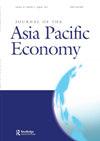发展中国家农村居民负担分担当地基础设施供应成本意愿的影响因素:来自中国的证据
IF 1.5
4区 经济学
Q3 ECONOMICS
引用次数: 0
摘要
基础设施是发展中国家农村发展的基础。然而,农村政府比城市政府承受更大的财政约束。因此,农村居民补贴基础设施供应的能力对于促进供应至关重要。虽然这种能力有所提高,但农村居民承担成本负担的意愿仍然很低。然而,影响意愿的因素仍未得到研究。本研究透过“公共物品理论”的视角,找出影响因素,以弥补这一不足。对266名农村居民进行了实地调查。结果表明,对负担能力的看法受到政府政策、公平负担分担观念和群体行为的影响。情境认知在影响农村居民意愿中起着重要的中介作用。“搭便车效应”也被证实是一个因素。本研究的结果为提高发展中国家农村基础设施投资的可承受性提供了策略,方法是提高受益者的付费使用意愿。关键词:农村基础设施可负担性公共产品理论sem披露声明作者未报告潜在利益冲突。数据可得性声明支持本研究结果的数据可根据通讯作者的合理要求获得。项目资助:国家自然科学基金项目[no . 72201185,2022]。作者简介蒋卫玲,四川农业大学建筑与城乡规划学院建筑管理专业讲师。毕业于四川大学,获工学学士和博士学位。她的研究重点是基础设施投资的风险管理和农村基础设施的可负担性。范杨义(音译)是四川农业大学建筑与城乡规划学院建筑管理专业的一名本科生。他对农村基础设施发展有浓厚的研究兴趣,擅长数学建模。Igor Martek,澳大利亚迪肯大学建筑管理高级讲师。他在墨尔本大学获得“国际建设中的企业战略”博士学位。他拥有新南威尔士州澳大利亚管理研究生院的工商管理硕士学位和堪培拉澳大利亚国立大学的国际关系硕士学位。他在世界各地的大型资本项目评估、生成和管理方面有着广泛的行业经验。他曾在欧洲工作,包括东欧、马格里布、黎凡特、中国、韩国,并在一家总部位于东京的英国咨询公司担任了10年的远东董事总经理。他的研究兴趣包括资本项目的采购和促进作为国家竞争战略的工具,以及国际建筑公司的竞争行为。齐慧欣(音译)是四川农业大学建筑与城乡规划学院建筑管理专业的一名本科生。她熟悉农村地区的基础设施情况。李颖是四川农业大学商务与旅游学院的一名本科生。她是数据分析方面的专家。本文章由计算机程序翻译,如有差异,请以英文原文为准。
The factors affecting rural residents’ willingness to burden-share costs of local infrastructure supply in developing countries: evidence from China
AbstractRural infrastructure is fundamental to rural development in developing countries. Yet, rural governments endure heavier fiscal constraints than their urban counterparts. Thus, the capacity of rural residents to subsidize infrastructure supply is critical to facilitating provision. While this capability has increased, the willingness of rural inhabitants to absorb cost burdens remains low. However, the factors impacting willingness remains unexamined. This study addresses this deficiency by identifying influencing factors through the lens of “public goods theory.” A field survey of 266 rural Chinese residents is conducted. Results reveal that opinions on affordability are shaped by government policy, perceptions of equitable burden-sharing, and group behavior. Situational cognition plays an important intermediary role in affecting rural residents’ willingness. The “free-rider effect” is also confirmed as a factor. The findings of this study offer strategies for increasing the affordability of rural infrastructure investment in developing countries by raising the pay-for-use willingness of beneficiaries.Keywords: Rural infrastructureaffordabilitywillingness to paytheory of public goodsSEM Disclosure statementNo potential conflict of interest was reported by the author(s).Data availability statementThe data that support the findings of this study are available from the corresponding author upon reasonable request.Additional informationFundingThis work was supported by the National Natural Science Foundation of China under grant [numbers 72201185, 2022].Notes on contributorsWeiling JiangWeiling Jiang is a lecturer in Construction Management at School of Architecture and Urban-Rural Planning, Sichuan Agricultural University, China. She received her B.Eng. and Ph.D. from Sichuan University. Dr. Jiang focuses her research on risk management in infrastructure investment, and affordability of rural infrastructure.Yangyi FanYangyi Fan is an undergraduate student majoring in construction management at the School of Architecture and Urban-Rural Planning, Sichuan Agricultural University. He has a strong research interest in rural infrastructure development, and he is good at mathematical modeling.Igor MartekIgor Martek is a Senior Lecturer in in Construction Management at Deakin University, Australia. He earned his PhD in “Enterprise Strategies in International Construction” from the University of Melbourne. He has an MBA from the Australian Graduate School of Management, NSW, and an MA in International Relations from the Australian National University, Canberra. He has worked extensively in industry in evaluating, generating and managing large capital projects in various locations around the world. He has worked in Europe, including Eastern Europe, the Maghreb, Levant, China, Korea, and was managing director, Far East, of a British consultancy firm based in Tokyo, for 10 years. His research interests include the procurement and facilitation of capital projects as an instrument of national competitive strategy, and the competitive behaviors of international construction firms.Huixin QiHuixin Qi is an undergraduate student majoring in construction management at the School of Architecture and Urban-Rural Planning, Sichuan Agricultural University. She is familiar with infrastructure situation in rural areas.Ying LiYing Li is an undergraduate at the School of Business and Tourism, Sichuan Agricultural University, China. She is expert in data analysis.
求助全文
通过发布文献求助,成功后即可免费获取论文全文。
去求助
来源期刊

Journal of the Asia Pacific Economy
ECONOMICS-
CiteScore
3.70
自引率
7.10%
发文量
58
期刊介绍:
Journal of the Asia Pacific Economy (JAPE) is concerned primarily with the developing economies within Pacific Asia and South Asia. It aims to promote greater understanding of the complex factors that have influenced and continue to shape the transformation of the diverse economies in this region. Studies on developed countries will be considered only if they have implications for the developing countries in the region. The journal''s editorial policy is to maintain a sound balance between theoretical and empirical studies. JAPE publishes research papers in economics but also welcomes papers that deal with economic issues using a multi-disciplinary approach. Submissions may range from overviews spanning the region or parts of it, to papers with a detailed focus on particular issues facing individual countries. JAPE has a broad readership, which makes papers concerned with narrow and detailed technical matters inappropriate for inclusion. In addition, papers should not be simply one more application of a formal model or statistical technique used elsewhere. Authors should note that discussion of results must make sense intuitively, and relate to the institutional and historical context of the geographic area analyzed. We particularly ask authors to spell out the practical policy implications of their findings for governments and business. In addition to articles, JAPE publishes short notes, comments and book reviews. From time to time, it also publishes special issues on matters of great importance to economies in the Asia Pacific area.
 求助内容:
求助内容: 应助结果提醒方式:
应助结果提醒方式:


